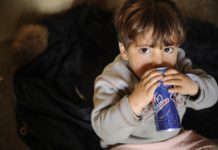
Several new research papers present at the meeting take a close look at childhood obesity
The tendency to put on weight and to eventually become obese is poorly understood; yet it is a pattern consistently observed that children who are obese are more likely to be obese as adults.
And sugar sweetened beverages or cold drinks are a primary culprit in childhood obesity.
A study that tracked more than 700 kids from the toddler to teen years finds intake of sugar-sweetened beverages was associated with a significantly higher body mass index (BMI) throughout childhood. Intake of milk, 100% juice and water-based sugar-free beverages was not associated with any difference in BMI. As one of the first longitudinal studies to examine children’s beverage consumption over time, the study bolsters the evidence that sugar-sweetened beverages are an important risk factor for obesity.
New research also takes a broad look at the outcomes of such programs to understand which factors seem to be associated with greatest success
This is one of the studies presented at Nutrition 2018.
The Nutrition 2018 meeting will feature new research on factors that may contribute to childhood obesity, as well as factors that can help kids maintain a healthy weight. Nutrition 2018 is the inaugural flagship meeting of the American Society for Nutrition on from June 9-12, 2018 at the Hynes Convention Center in Boston.
Many programs and policies have been implemented to curb overweight and obesity rates in children and teens. New research also takes a broad look at the outcomes of such programs to understand which factors seem to be associated with greatest success. Examples of impactful interventions include the use of scratch cooking for preparing school meals, not using physical activity for discipline at school and promoting drinking water at school. Lorrene D. Ritchie, Nutrition Policy Institute, University of California, will present this research on Monday.
Kids in America eat a wide variety of morning foods, from cereal and milk to pancakes and pastries to eggs and fruit. In a new study funded by the Kellogg Company, kids who ate breakfast generally showed higher daily consumption of recommended nutrients including fiber, calcium, vitamin D and potassium, as well as greater whole grain and lower added sugar intake compared to those who did not eat in the morning.
In particular, consuming grain-based foods with milk for breakfast was linked with several health benefits, showed one of the studies presented at the meeting.













